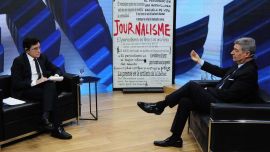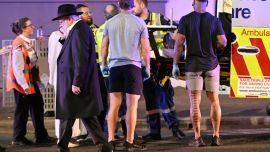An appeals court in Buenos Aires has revoked the controversial two-year suspended prison sentence handed down to Buenos Aires provincial policeman Luis Chocobar three years ago for the gunning down of 18-year-old thief Juan Pablo Kukoc in 2017.
The City’s Cassation Court ruled Monday that the trial in which Chocobar was condemned should be annulled, describing the sentence as contradictory and without any proper basis.
It ordered a new trial should take place, adding that Chocobar’s alleged conduct at the time of Kukoc’s death was not proven.
No date has been set for a new trial, though it is not expected to take place this year.
The ruling came just days after it emerged that Chocobar had asked to be “voluntarily discharged” from the provincial police.
Chocobar’s case sparked furious debate about policing and the use of deadly force. The policeman shot Kukoc in the back on December 8, 2017, as the thief tried to escape after attacking and robbing US citizen Joe Wolek in the La Boca neighbourhood of Buenos Aires.
The scene was captured by surveillance cameras and video footage of the incident circulated widely online.
While the family of the teenager decried his killing, Argentina’s then-government strongly backed the policeman. Patricia Bullrich, who served as national security minister at the time, was a vocal supporter of Chocobar, describing him as a hero.
Then-president Mauricio Macri even received the officer at the Casa Rosada to show his support. He also blasted the judge who formally accused the officer in the criminal investigation.
The support for policing was welcomed by crime-weary citizens, but human rights groups argued hosting Chocobar at Government House sent out the wrong message in a country where thousands were killed and forcibly disappeared at the hands of police and security officers during the 1976-1983 military dictatorship.
The case inspired the so-called ‘Chocobar doctrine,’ approved by Bullrich, which expanded the rights of police officers to exercise lethal force. Human rights groups criticised the new rules, saying they ran contrary to international law.
It was repealed in 2019 by the following arrival of former president Alberto Fernández to power. His government introduced a new code that said police officers should “act in proportion to the seriousness of the harm, respecting and protecting human life.”
Bullrich then reinstated the rules when she returned as security minister in President Javier Milei’s government in December 2023.
In March, she unveiled new rules governing the use of firearms by federal forces, empowering officers to respond to violent situations and subdue criminals who resist or flee.
Previous trial
Chocobar was found guilty of “homicide aggravated by the use of a firearm, committed in excess of the line of duty” in 2021 and handed a two-year suspended prison sentence.
But on Monday, the Cassation Court criticised the trial, highlighting inconsistencies with the case and conviction.
In a 166-page ruling issued by the court, judges highlighted the “self-contradiction involved” in condemning the four shots fired by Chocobar in the incident as “excessive, unnecessary and disproportionate,” only to then mention that “only one shot in that round condensed such negative qualities.”
“This court must judge whether the judges of the oral court were right or wrong to deem or dismiss the defendant’s conduct as malicious,” said Judges Horacio Días and Eugenio Sarrabayrouse.
“What magistrates believed about this point is unknown, because the truth is that – among the many dubious references – only the idea that there was no homicidal intent seems to be unanimous; to decide on the matter would mean exercising trial court jurisdictions,” they warned.
“The problem is compounded because the examination of the malicious intent accusation was a problem relevant to the issues raised by the parties in their defence statements, which violates the general duty of validly solving referred to oral courts,” they insisted.
The appeals court decided to remove the trial judges who convicted and sentenced Chocobar.
Presidential praise
President Milei celebrated the decision as a “shot on the side of justice,” in a post on social media.
“The guys in uniform are the good guys and criminals are the bad guys,” he added.
Defence Minister Luis Petri also expressed his joy, calling the reversal a “great news” given the “unjust sentence” handed down to Chocobar three years ago.
It’s the latest in a series of court decisions in recent months that have favoured the government’s view of an issue.
Bullrich said the decision is proof that Argentina is making “great strides.”
“I’ve been telling you for seven years, the Chocobar doctrine is the good cop doctrine, of those who defend citizens. Today the Criminal Court of Appeals gave him absolution, which is what had to happen,” she added, incorrectly stating that he had been cleared.
However, Pablo Rovatti, a lawyer for Kukoc’s relatives, highlighted that the court “did not acquit Chocobar.”
"It is true that the conviction was confusing and there was room for improvement, but we maintain that with effort the conviction could have been resolved. We have to evaluate if it is convenient to present an appeal to the Supreme Court, but we believe that we are not going to do it because it generates delays,” he said.
"Going to a new trial involves many issues, not only for the defence, but also for the anguish of the family,” Rovatti told the Noticias Argentinas news agency.
"We insist that the trial takes place soon, although we know that it will not happen this year. We have to see what the police officer's defence [team] does, but as far as we know they are going to file an appeal," he said.
Fernando Soto, Chocobar's lawyer, complained that his client “should have been acquitted.”
“There was enough evidence to show that he had acted correctly. They say that they do not have enough evidence to convict or acquit him, and for this reason they are asking for a new trial," he said.
– TIMES with agencies


















Comments